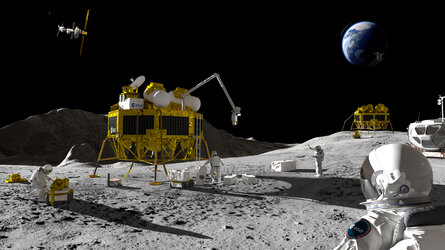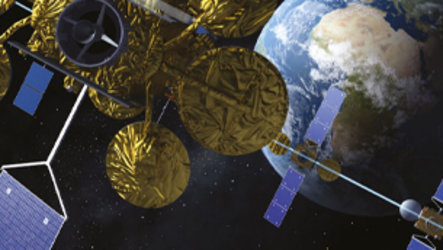ESA Redu ground station contract extended
ESA has renewed the contract to operate and develop its Redu ground station in Belgium. The centre is responsible for controlling and testing a range of satellites as part of the Agency’s network of stations.
The Redu Centre provides
The site, in Belgium’s Ardennes region, hosts multiple steerable antennas operating in a variety of frequency bands. After a satisfactory first three-year period, Redu Space Services (RSS) will continue to operate the station.
With the support of the Belgian authorities, large investments have been made, such as the installation of new power lines to bear the load of future projects and the station’s extension of around 10 000 sq m. ESA is building a new plant to power the Galileo facilities and new customers.

The 20 m
In 2009, RSS signed its first Advanced Research in Telecommunications Systems (ARTES) contract, to modify the
“The last three years have been a time for change for Redu,” says Daniele Galardini, Head of the Redu Centre within ESA’s Directorate of Telecommunications and Integrated Applications.
“The shared ‘win-win’ approach regulated by the contract between ESA and RSS has allowed an optimisation of the resources on site and a reduction of the costs, to the benefit of both parties. Third-party activities making use of ESA facilities will be executed to the full satisfaction of new customers by RSS. This has been proven by the achievements of RSS during the past three years.
“This approach allows ESA to focus on its core business – supporting demonstration missions, Proba satellites and missions such as Artemis, and hosting ESA’s Galileo and Space Situational Awareness facilities.”
The increase in its activities led to the recognition of Redu as an ESA Centre and its full integration into the ESA structure of establishment and centres in 2009.















 Germany
Germany
 Austria
Austria
 Belgium
Belgium
 Denmark
Denmark
 Spain
Spain
 Estonia
Estonia
 Finland
Finland
 France
France
 Greece
Greece
 Hungary
Hungary
 Ireland
Ireland
 Italy
Italy
 Luxembourg
Luxembourg
 Norway
Norway
 The Netherlands
The Netherlands
 Poland
Poland
 Portugal
Portugal
 Czechia
Czechia
 Romania
Romania
 United Kingdom
United Kingdom
 Slovenia
Slovenia
 Sweden
Sweden
 Switzerland
Switzerland



























